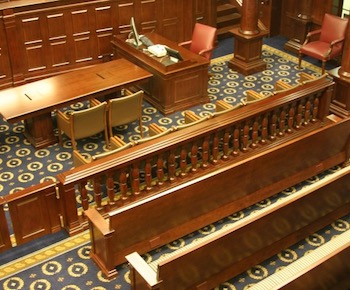 WesternGeco LLC v. ION Geophysical Corp., Nos. 2016-2099, 2016-2100, 2016-2101, 2016-2332, 2016-2333, 2016-2334, 2018 (Fed. Cir. May 7, 2018) (Before Wallach, Chen, and Hughes, J.) (Opinion for the court, Chen, J.)
WesternGeco LLC v. ION Geophysical Corp., Nos. 2016-2099, 2016-2100, 2016-2101, 2016-2332, 2016-2333, 2016-2334, 2018 (Fed. Cir. May 7, 2018) (Before Wallach, Chen, and Hughes, J.) (Opinion for the court, Chen, J.)
Petroleum GeoServices Inc. (PGS) successfully challenged WesternGeco’s patents in two rounds of IPRs before the Board. In the second round, the Board granted ION’s request under 35 U.S.C. § 315(c) to join the proceedings but restricted its involvement to receiving notifications of filings and attendance. On appeal, WesternGeco argued 1) the Board erred as to its unpatentability determinations; and 2) the IPR proceedings were time-barred under 35 U.S.C. § 315(b) because ION acted in privity with PGS, and over a year passed between its infringement complaint against ION and the PGS IPR petition.
Based on the Federal Circuit’s en banc decision known as Wi-Fi One, the time-bar issue was appealable, but WesternGeco’s argument was unpersuasive because the relationship between ION and PGS was not close enough to trigger the time bar. The Federal Circuit weighed the legislative intent of preventing successive challenges to patents versus due process, i.e., whether a party had a full chance to be heard. The due process concerns implicate nonparty preclusion which is evaluated according to Taylor v. Sturgell, 553 U.S. 894–95 (2008). The Court noted ION’s inability to control PGS’s petitions based on its lack of involvement in the IPR (no funding, no assistance, distinct entities, and different counsel). Also, the Board properly found the consumer-manufacturer relationship between ION and PGS to be standard and consequently insufficient to be a proxy. Moreover, the indemnity provisions in their agreement were silent regarding ION’s responsibility for patent infringement suits and invalidity challenges.
Take Away
A time bar will not be imposed to prevent successive IPR and litigation challenges to a patent based on alleged privity with a non-party, when the parties have a standard consumer-manufacturer relationship without specific indications of mutual involvement in and control of the relevant judicial proceedings.
[Troutman-Ad]
[Troutman-About]

![[IPWatchdog Logo]](https://ipwatchdog.com/wp-content/themes/IPWatchdog%20-%202023/assets/images/temp/logo-small@2x.png)


![[Advertisement]](https://ipwatchdog.com/wp-content/uploads/2024/04/Artificial-Intelligence-2024-REPLAY-sidebar-700x500-corrected.jpg)
![[Advertisement]](https://ipwatchdog.com/wp-content/uploads/2024/04/UnitedLex-May-2-2024-sidebar-700x500-1.jpg)
![[Advertisement]](https://ipwatchdog.com/wp-content/uploads/2024/04/Patent-Litigation-Masters-2024-sidebar-700x500-1.jpg)

![[Advertisement]](https://ipwatchdog.com/wp-content/uploads/2021/12/WEBINAR-336-x-280-px.png)
![[Advertisement]](https://ipwatchdog.com/wp-content/uploads/2021/12/2021-Patent-Practice-on-Demand-recorded-Feb-2021-336-x-280.jpg)
![[Advertisement]](https://ipwatchdog.com/wp-content/uploads/2021/12/Ad-4-The-Invent-Patent-System™.png)






Join the Discussion
No comments yet.